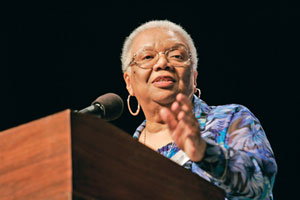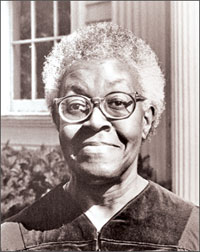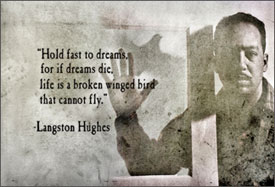|
Interpreting Interpreters:
Strategies of Resistance in Afro-American poetry
By Mahendran THIRUVARANGAN
|

Lucille Clifton addresses a conference
|
African-American poetry has a political function in that not only
does it record the oppression of African-Americans in the USA by Whites
but it also represents and "re-presents" African-Americans' history,
culture and civilization, which are either erased completely from or
misrepresented and looked down upon in mainstream American poetry.
Although we could call African-American poetry a "literary rebellion"
against mainstream American poetry, which depicts the values and culture
of the White, middle and upper class, Christian, heterosexual, male
Americans as "American values" and "American culture," it should be
noted that not all African-American poets nor all the poems written by
an African-American poet are counter-hegemonic in spirit.
This essay, making special reference to six poems written by
African-American poets, examines why interpreters are (not) needed to
explain Afro-American poetry to readers outside the African-American
community. Although poets of both genders are given equal importance, I
am aware that my selection of poems is not representative of the entire
body of African-American poetry, for the poems examined here barely map
the internal differences found in the African-American community along
the lines of region, religion, class and ideology.
Langston Hughes' 'The Negro Speaks of Rivers' is a relatively less
challenging poem to non-African-American readers. The African-American
speaker in the poem, by describing his historical attachment to the
different rivers in Africa and North America, at the mouths of which the
ancient civilizations of the world emerged, asserts that
African-Americans' civilization is one of the founding civilizations of
the world:
I bathed in the Euphrates when dawns were young,
I built my hut near the Congo and it lulled me to sleep,
I looked upon the Nile and raised Pyramids over it,
I heard the singing of the Mississippi […].
|

Gwendolyn Brook-34 |
Hughes, through the literary space of poetry, reclaims in this poem
the geographic spaces of civilization, which the "White custodians" of
European and American civilizations deny African-Americans. Being
counter-hegemonic in spirit, the poem challenges the mainstream view
that African-Americans have neither a history nor a civilization of
their own. No reader who is familiar with the history of human
civilization would find this poem a difficult one to understand. In this
regard, Hughes' resistance to White hegemony in 'The Negro Speaks of
Rivers' is direct and overt.
'Note on Commercial Theatre,' although thematically akin to 'The
Negro Speaks of Rivers,' is a moderately difficult poem in comparison
with 'The Negro Speaks of Rivers.' As 'The Negro Speaks of Rivers'
reclaims African-Americans' civilizations, 'Note on Commercial Theatre'
reclaims African-Americans' "proprietorship," as it were, of their art
and music, from Europeans. White historians of music wrote that jazz and
the blues, two varieties of music, came from Europe, and thereby denied
African-Americans the heritage of their arts.
Hughes underlines that not only have Europeans and Whites "taken" the
arts belonging to African-Americans but they have also polluted and
blemished the "original" character of those arts by mixing them "with
symphonies." Non-African-American readers unfamiliar with the blues and
the spirituals belonging to African-Americans may require an interpreter
to understand this poem. Non-African-American readers' awareness of the
art forms-the Blues and the spirituals-is, therefore, crucial to their
understanding of this poem. However, one could argue that Hughes, by
drawing non-African-American readers' attention to the art forms
belonging to African-Americans, cautions non-African-American readers
about the misrepresentations in the mainstream accounts of those art
forms written by Whites.
Nikki Giovanni's 'The True Import of Present Dialogue: Black vs.
Negro' is written in a language which may baffle, if not frighten,
readers whose ears are attuned to the "refined" language which is found
in the poetry of mainstream American poets such as Robert Frost and
Wallace Stevens. Giovanni's poem, as noted by Lilamani De Silva, is
"strong" and "militant" (104), for it is skeptical about the idea that
African-Americans can win their freedom through passive resistance and
non-violence:
Nigger
Can you kill
Can you kill
Can a nigger kill
Can a nigger kill a honkie
Can a nigger kill the man
|

Langston Hughes |
Giovanni does not inscribe this poem in the language of mild protest;
instead, her poem underlines the importance of a language of resistance
which is radical and militant, and a poetic idiom which departs from the
diction of mainstream American poetry. 'The True Import of Present
Dialogue: Black vs. Negro,' therefore, carves a new poetic contour which
is revolutionary in its content and style. The poem urges the reader to
see its refusal to comply with the poetic conventions of mainstream
American poetry as an act of resistance on the part of the
African-American poet. If we regard Giovanni's rejection of the
conventions of diction observed in mainstream American poetry as an act
of resistance, 'The True Import of Present Dialogue: Black vs. Negro'
will certainly make more sense.
Like Giovanni's poem, Lucille Clifton's 'Homage to My Hips' is
radical and unconventional. By "celebrating her hips and singing that
fat is beautiful" (Lilamani De Silva 108), the poet deconstructs the
conventional, race-biased standards by which feminine beauty is valued
and hierarchized in the mainstream cultural systems of American society:
these hips are big hips.
they need space to
move around in.
they don't fit into little
petty places. these hips
are free hips.
they don't like to be held back.
these hips have never been enslaved,
they go where they want to go
they do what they want to do.
these hips are mighty hips.
these hips are magic hips.
i have known them
to put a spell on a man and
spin him like a top!
The poem is counter-hegemonic in two ways in that it asserts the
freedom of both women and African-Americans from male-chauvinism and
White hegemony respectively. Written in a language that is simple,
direct and economical, 'Homage to My Hips,' like Langston Hughes' 'The
Negro Speaks of Rivers,' is less challenging to non-African-American
readers; nevertheless, Clifton expects us to see her attempt to "free"
the poem from complex patterns of versification and language from
capitalization to the themes of celebrating difference and freedom. It
is only when we make connections between the content, structure and
style of 'Homage to My Hips' that we see the emergence of a poetic
expression of resistance which calls simultaneously for the liberation
of two marginalized subject positions- the female and the
African-American.
In 'Kitchenette Building,' Gwendolyn Brooks, another major female
African-American poet, describes the conditions of ghetto living.
Brooks' voice in the poem, unlike Giovanni and Clifton's, is dispirited.
The poem brings to the fore the trials and tribulations of underclass
African-Americans and underscores that the non-availability of the
economic wherewithal necessary for the advancement of African-Americans
has deprived their community of dreams about a better life:
We are things of dry hours and the involuntary plan,
Grayed in, and gray. "Dream" makes a giddy sound, not strong
Like "rent," "feeding a wife," "satisfying a man."
But could a dream sent up through onion fumes
Its white and violet, fight with fried potatoes
And yesterday's garbage ripening in the hall,
Flutter, or sing an aria down these rooms […].
The most pressing realities in the lives of African-Americans,
according to Brooks, are "rent," "satisfying a man," "feeding a wife,"
and the uncleared garbage of the previous day. The "Number Five" in the
last stanza refers not only to the fifth person of a group of
African-Americans sharing the same ghetto and the same bathroom but also
to the nameless, "identity-less" state of African-Americans in the
"White-dominant" United States of America.
As Lilamani de Silva notes, this poem is rooted deeply "in the
specificity of the socio-historical and cultural milieu of the
underclass" (100). For example, according to a commentator, the phrases
"onion fumes" and "fried potatoes" collectively refer to a Southern dish
made by poor Blacks by frying a combination of potatoes and onions. The
commentator also says that "the involuntary plan" denotes "the real
estate plans to exploit Black people, who were moving into formally
White neighborhoods and the break up of formally large, spacious, single
family apartments into shared, cramped, overcrowded spaces for higher
profits" (Anonymous, oldpoetry.com). Non-African-American readers who
are not familiar with these cultural and historical details might face
difficulties in grasping the complete meaning of 'Kitchenette Building.'
However, these references are included in the poem not for the
purpose of confusing non-African-American readers but with a view to
inviting them to see the harsh realities engulfing the lives of
African-Americans, and to understand African-Americans' history and
culture, which White hegemony has carefully concealed beneath the
seemingly all-inclusive captions of "American culture" and "American
history."
Paul Laurence Dunbar's 'The Party' is a poem in which satire is
directed towards African-Americans who, in pursuit of upward social
mobility, blindly mimic their white masters in their dress and manners:
Evahbody dresses deir fines'- Heish yo' mouf an' git away,
Ain't seen sich fancy dressin' sence las' quah'tly meetin'
day;
Gals all dressed in silks an' satins, not a winkle nor a crease,
Eyes a-battin, teeth a-shinin, haih breshed back ez slick ez
grease;
[…]
Men all dressed up in Prince Alberts, swallertails 'u'd tek you'
bref!
[…]
Comin' down de flo' a bowin' an' swayin' an' a-swinging',
Puttin' on huh high-toned mannahs all de time […].
The most difficult aspect of this poem is that it is written in the
dialect spoken by African-Americans. The dialect spoken by
African-Americans is a "non-standard" variety of American English, and
one that is often stigmatized by White speakers of English in the USA.
The poet, by using this non-standard dialect, "legitimizes" the language
spoken by African-Americans, and elevates it to a position equivalent to
that of General American English.
Although readers who are not familiar with this dialect might find
this poem a difficult one, when considering this poem with respect to
Dunbar's statement that "dialect was the only way to get [white] people
listen to me" (Margolies 28), we see that Dunbar's selection of the
dialect spoken by African-Americans to write this poem enables him to
launch his resistance to White hegemony effectively and fittingly in a
language that makes up African-Americans' identity. William Dean Howells
notes that "Dunbar's dialect verse was a representation of reality," and
that "the political import of [the use of the dialect] was unassailable"
(Gates 177). As the language used in the poem serves the Afro-American
poet's political function of emphasizing the role of the dialect in
everyday mass communication of African-Americans, the dialect used in
'The Party' should be seen as a positive requirement of poetic
resistance rather than as a negative limitation curtailing the meaning
making process of non-African-American readers.
As literary vehicles for resistance, the poems discussed above are
"coded and culture-bound" in places (De Silva 99), and therefore
non-African-American readers may find difficulties in understanding
certain sections of the poems which portray the cultural aspects of the
trendy lifestyle of African-Americans and their history. Moreover, the
language used in some poems may appear to readers who are not conversant
with the dialect spoken by African-Americans an obstacle to
understanding the poem. On account of these aspects of African-American
poetry, readers outside the African-American community sometimes require
a class of interpreters to appreciate Afro-American poetry.
The importance of interpreters to non-African-American readers,
however, does not mean that African-American poetry is esoteric or
unintelligible; instead, as argued by Lilamani De Silva, the necessity
for a class of interpreters invites, if not compels,
non-African-American readers, particularly White American readers, to
"consider and appreciate the traumas of black readers who had to try and
belong in a culture that consistently did not write for them,
marginalized, excluded, ignored, or treated them as objects" (105). In
this regard, one could argue that, by creating a need for interpreters
among White American and non-African-American readers, African-American
poets launch their literary resistance to the hegemonic forces operating
against them, their literature and their community, and demand those
forces to recognise that their culture and civilization are not inferior
to any other culture or civilization in the world.
Works Cited
De Silva, Lilamani. "The Poetry of African-American Women: Making
Cultural Difference Meaningful." The Sri Lanka Journal of the
Humanities. XXI (1995): 99-113.
Gates, Jr., Henry Louis. The Signifying Monkey: A Theory of
African-American Literary Criticism. Oxford: Oxford University Press,
1988.
Margolies, Edward. Native Sons: A Critical Study of Twentieth-Century
Negro American Authors. New York: J. B. Lippincott, 1968.
Oldpoetry.com. "Kitchenette Building." 11 Mar. 2009
. |

